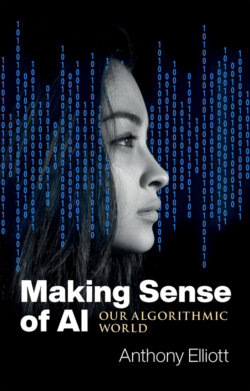Читать книгу Making Sense of AI - Anthony Elliott - Страница 10
Notes
Оглавление1 1 There have been some notable exceptions to the mainstream retelling of AI history, and important contributions which seek to narrate alternative histories of AI. The work of Genevieve Bell is of special significance in this connection. See, for example, Paul Dourish and Genevieve Bell, ‘“Resistance is Futile”: Reading Science Fiction and Ubiquitous Computing’, Personal and Ubiquitous Computing, 18 (4), 2014, pp. 769–78; and Genevieve Bell, ‘Making Life: A Brief History of Human–Robot Interaction’, Consumption Markets & Culture, 21 (1), 2017, pp. 1–20. The recent contributions of Australian historian Marnie Hughes-Warrington on historical machines are another significant attempt to narrate the history of technology otherwise. See also the interesting set of essays in Jessica Riskin (ed.), Genesis Redux, University of Chicago Press, 2017, especially in parts 2 and 3.
2 2 See, for example, Jerry Kaplan, Artificial Intelligence: What Everyone Needs to Know, Oxford University Press, 2016.
3 3 J. McCarthy, M. L. Minsky, N. Rochester and C. E. Shannon, ‘A Proposal for the Dartmouth Summer Research Project on Artificial Intelligence’, 31 August 1955: http://raysolomonoff.com/dartmouth/boxa/dart564props.pdf
4 4 See Nils J. Nilsson, The Quest for Artificial Intelligence: A History of Ideas and Achievements, Cambridge University Press, 2010.
5 5 See Ibn al-Razzaz al-Jazari, The Book of Knowledge of Ingenious Mechanical Devices, trans. Donald R. Hill, Springer, 1979.
6 6 See Kevin LaGrandeur, ‘The Persistent Peril of the Artificial Slave’, Science Fiction Studies, 38, 2011, pp. 232–51.
7 7 See ‘The Fall of “Old Brass Brains”’, Product Engineering, 41 (1–6), 1970, p. 98.
8 8 Alan M. Turing, ‘I. Computing Machinery and Intelligence’, Mind, LIX (236), 1950, pp. 433–60.
9 9 John Searle, ‘The Chinese Room’, in R. A. Wilson and F. Keil (eds.), The MIT Encyclopedia of the Cognitive Sciences, MIT Press, 1999, p. 115.
10 10 Susan Schneider, Artificial You: AI and the Future of Your Mind, Princeton University Press, 2019, pp. 11–12.
11 11 The best account of globalization as a multidimensional institutional force remains David Held et al., Global Transformations, Polity, 1999.
12 12 M. Mitchell Waldrop, The Dream Machine: J. C. R. Licklider and the Revolution That Made Computing Personal, Stripe Press, 2018, p. 12.
